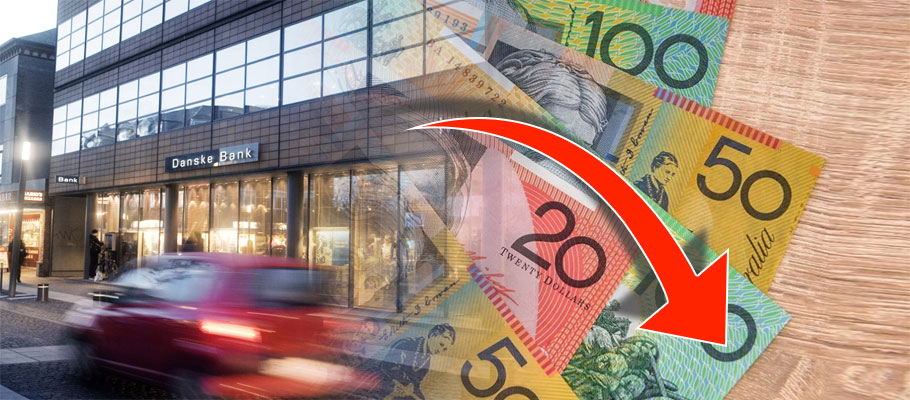
Published: October 9th, 2024
A note to investors from Danske Bank this week advises its forex clients to sell Australian Dollars, pointing to a US soft landing as the rationale.
A soft landing in this context means the Nordic bank’s analysts believe the Federal Reserve has successfully brought down inflation while sidestepping a significant economic downturn.
Fed moves can influence AUD’s value as it's considered a 'high beta' currency that tends to exceed its G10 peers when the Greenback is under pressure and stock markets are on the up.
Danske thinks AUD can now become a way to profit from the view that the recent decline in USD is over, and that the broader market rally is coming to an end.
Analysts wrote that the Fed's easing cycle is 'currently priced to perfection,’ adding that any additional weakness in global growth indicators ‘might begin to weigh on cyclical currencies like AUD.
The Aussie faces another risk if the American economy turns out to be more resilient than expected. This would raise the threshold markets have priced in as the point where the Fed will end its interest rate-cutting cycle. That would put wind at the Dollar’s back and also weigh on the Down Under fiat.
‘In our view the risk-reward of shorting AUD/USD is attractive following the most recent rally.’
The looming impact of events in China don't factor into Danske’s position, not even speculation that Beijing is set to inject significant monetary and fiscal stimulus. As a prime destination for Australia's commodity exports, this would normally be expected to have a notable impact on AUD’s value.
But Danske analysts aren’t convinced. ‘We doubt that any economic stimulus package will be enough to mitigate the Chinese economy’s structural challenges.’
In August, an analysis by Dutch investment giant Rabobank suggested that policy actions by the Reserve Bank of Australia (RBA) would likely extend what had been a recent show of strength for AUD.
The bank brought its forecast targets for the Aussie forward on expectations that the RBA would raise interest rates twice this year, first in August and then later in November, as it fought to cool persistent inflation.
"Recent economic prints have firmed up our expectations for more rate hikes in this cycle," said Rabobank in a note to investors. The analysis notes that retail sales growth in May was 0.6 per cent month-over-month, pointing to strong consumer demand.
The yearly pace of CPI inflation, meanwhile, fell back to 3.5 per cent from the 4.2 per cent seen in the first quarter. This was ahead of consensus, which anticipated an easing to 3.6 per cent.
The trimmed mean, a closely watched measure of core inflation, rose one per cent in Q1, beating the consensus forecast of 0.8 per cent. The yearly pace fell back to 4 per cent, from 4.2 per cent.
A recent decision by Canberra to lower taxes for all 13.6 million Australian taxpayers from July 1st was not expected to reduce inflation, rather raising the potential for increased consumer demand. The RBA has said the economic impact of the tax cut brings an element of uncertainty.
Any additional RBA interest rate hikes this year would place it out of sync with other major central banks. Rabobank believes the interest rate differential would be supportive of AUD.
In early June, analysts were predicting that a nudge from the RBA would lift AUD to highs last seen a year earlier in June 2023. Analysts were betting that central bankers in Sydney would raise rates again to cool inflation, though a downward turn in global investor sentiment would eventually scuttle significant AUD gains.
Analysts believed inflation was rising based on an earlier print which came in above consensus at 3.6 per cent year-on-year. For AUD bulls, those figures offered support.
An analysis by Westpac said the central bank would play Hamlet in June. ‘To hike or not to hike? That is the question for RBA policymakers after a hotter-than-expected set of inflation figures arrived on Monday. AUD bulls are now straining to hear the answer.’
Westpac believed another rate rise will act as a trigger for forex traders closely observing AUD and NZD.
Australian CPI rose unexpectedly to 3.6 per cent in April (YoY), its highest level for six months. Economists were looking for a decline to 3.4 per cent.
An analyst note from Crédit Agricole’s FX strategy unit said digging into the CPI report’s details showed core inflation is the issue. With items with volatile pricing excluded, inflations looked stable at 3.5 per cent year on year.
The bank, however, was on the lookout for signs of upward pressure on monthly inflation figures in the pipeline, as prices for professional services were expected to swell in the coming months.
Minutes from the previous RBA meeting revealed that the bank’s policy committee believed a rate rise might be in the offing if inflation forecasts turn out to be overly optimistic.
'If the RBA delivers a rate rise at its mid-June meeting or signals strongly that a Q3 rise is possible, it might send AUD/USD back up to 0.69, its June 2023 high.’
Around this time in 2023, worries about China's property sector spilled over into currency markets, placing AUD on the back foot against G10 peers. Real estate stocks had weighed on Chinese economic underperformance for the previous eight months, leading to bouts of weakness for the export-sensitive Aussie.
A report by Bloomberg said that Chinese property stocks had fallen to their worst valuations in eight months as worry about a possible liquidation of the country’s giant Evergrande Group pointed to stress across the sector.
Evergrande, a China's largest property developer, saw its stock sink by 25 per cent after it called off meetings with major creditors at the last minute and announced its debt restructuring plan needed to be re-visited.
The biggest stock market casualty, however, was China Aoyuan Group, which sank by a record 75 per cent when markets resumed trading on Tuesday.